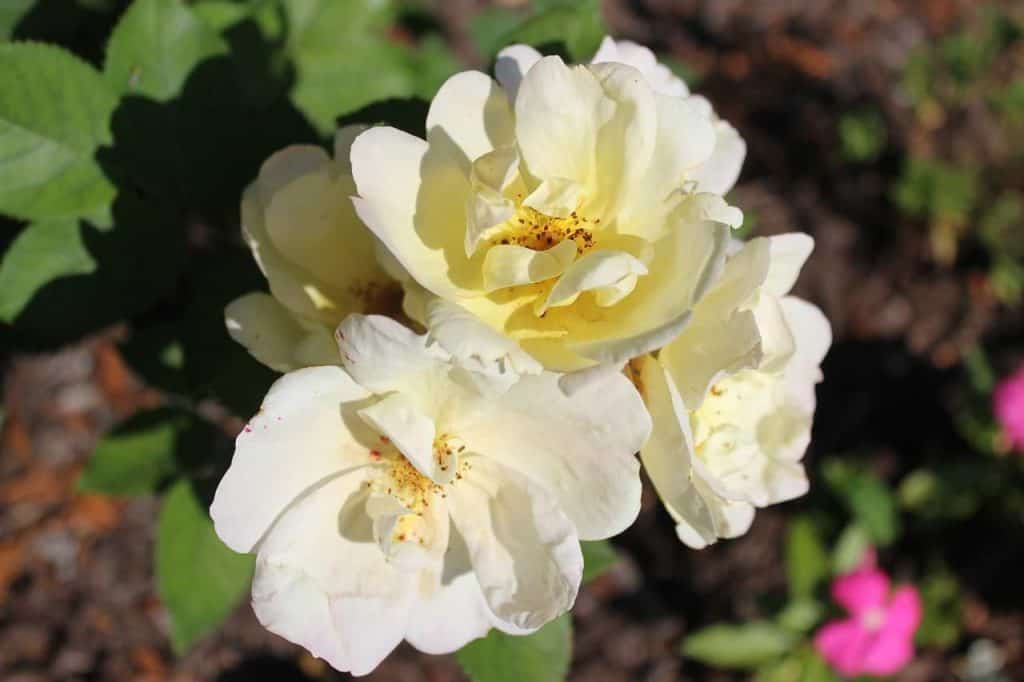What’s the best fertilizer for Knock Out roses?
Best fertilizer for Knock Out roses: Knock Out® roses can do well without any fertilizer application. Even more so if you regularly supply garden compost to the surrounding soil.
If you do wish to provide your Knock Out roses with an occasional boost, first you should allow the roses to become nicely established. Plus, the roses should have already gone through a bloom cycle before fertilizing.
Best Rose Food for KnockOut Roses
Knock Out® roses are very floriferous. They are hardy. They are, unlike other types of roses, quite undemanding. However, as is the case with any flowering shrub, Knock Out® roses benefit from the addition of fertilizer – at least from time to time.
By fertilizing KnockOut roses it means that the plants will be healthier and you’ll enjoy more blooms. All the same, with Knock Out roses, even without fertilizer they will continually show bloom. Without fertilizer, unless your soil is particularly fertile, you’ll not enjoy quite the same flowering profusion as otherwise.
Where Do Knock Out Roses Come From?
Knock Out roses were first introduced in the year 2000 by the Conard-Pyle Company.
These roses are tolerant to heat and to cold.
They perform at their best in zones 5 through 9.
There are now ten different Knock Out roses that come in various colors.
They reach between three and four feet in height and the same three to four feet across. A relatively compact, bushy rose, they are ideal for flower beds, raised beds, and will also perform well in containers.
Additional Tips for Fertilizing Knock Out Roses
Recommended Fertilizer for Knock Out Roses
Utilize a specific fertilizer that has been formulated for roses. Typically, that would be something along the lines of 6-12-6 or 6-9-6 in terms of N-P-K (nitrogen-phosphorus-potassium) ratio.
A granular fertilizer will break down relatively slowly with moisture (either rainfall or by way of hand watering or auto irrigation system). Granular fertilizers ensure that the plants will persistently benefit from nutrients.
Bayer Advanced All-in-One Rose and Flower Care Granules are the perfect fit. But not only in terms of fertilizer but also because Bayer Advanced is actually three products wrapped into one – fertilizer, disease control, and insect control.
Bayer Advanced Granules controls aphids, whiteflies, Japanese beetles, leafhoppers, adelgids, black vine weevil larvae, thrips, psyllids, mealybugs, and more troublesome insect pests.
Bayer Advanced Granules also controls the main rose diseases, including, rust, black spot, powdery mildew, and Southern blight.
As for fertilizer content, Bayer Advanced Granules has an NPK ratio of 6-9-6. Perfect!
Bayer Advanced All in One Rose Care Granules
Liquid fertilizers are also suited to Knock Out® roses. For the most part, rather than applying liquid fertilizer to the soil, it’s applied directly to the leaves. This is not always the case. Some liquid fertilizers are applied around the base of the plant.
Follow the instructions on the label with respect to the amount to apply and the method of application. Wait until after the initial flowering period has finished before making a fertilizer application.
Bayer Advanced All-In-One Rose and Flower Care Concentrate works in the same was as Bayer Advanced Granules. The difference is that this is a concentrate so you simply measure the quantity and pour it around the base of your rose bushes.
Again, same applies with Bayer Advanced Concentrate – it’s an all-in-one product that provides fertilizer, disease control, and pest control.
Bayer Advanced All-In-One Rose and Flower Care Concentrate
If you wish to apply granular fertilizer to the soil, so as to avoid any root burn the soil should be moist.
Avoid applying fertilizer to your roses in late summer. Late summer is when roses are starting to prepare for dormancy. If you make an application of fertilizer at this time of year the roses will likely start to grow. Any fresh growth late on in the season will be hit hard by frosts.




It seems hard with all your info re: knockout roses. I.e. some say use a higher NPL (27-3-3), while others say (6-9-6). I want FLOWERS, not green bushes. Help.
Hi Phyllis. To put it succinctly, here you go:
Potassium (otherwise denoted with the letter ‘K’) aids fruit AND FLOWERS to form while also toughening general plant growth to resist pests and diseases. Potassium likewise helps with resistance to drought or extreme cold. Potassium deficiency is more common on light, sandy soils. Signs of potassium deficiency include brown scorching and curling of leaf tips.
So it’s wise to go for a fertilizer that is high in potassium to avoid the scenario of roses that develop very few flowers.
Hope that helps!
Joseph